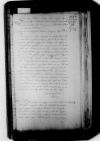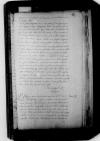Letter #421
Alfonso de VALDÉS to Ioannes DANTISCUSToledo, 1529-01-16
English register:
Valdés remarks that Dantiscus has no reason to make excuses for leaving without saying goodbye because people of their standing shouldn’t worry about empty ceremony. He is glad Dantiscus is counting on his help; he loves him no less than his own father. Not just Valdés but also all his friends liked Dantiscus’ epigram about Lalemand. At Dantiscus’ request, Valdés recounts the Lalemand affair: he was accused of betraying state secrets to the French, willfully making substantial changes in a document of imperial privilege and committing a few other deeds worthy of the highest punishment. At first he denied everything, then, in the face of Ronquillo’s testimony, he admitted to some of the charges but not to treason. It’s not clear yet what his punishment will be. He has many friends who are trying to secure his release, but also many enemies, so most likely he won’t avoid punishment. Valdés puts Lalemand in the same class as the crooks from the lives of Roman emperors – Turinus from the life of Alexander Severus and Zoticus from the life of Heliogabalus, also described by Erasmus in his Adagia. He encourages Dantiscus to write an epitaph for Lalemand if he would find it appropriate to honor a living person in this way. Valdés informs him that the chancellor [Mercurino Gattinara] returned before the Feast of Epiphany [January 6]. There has been no news from Italy or other regions. The emperor is sticking to his plan of traveling to Italy in spring even though almost everyone around him is against it. Valdés trusts the matter to Divine Providence. He sends Dantiscus new prints concerning the French. He has stopped the printing of his own text because he awaits the emperor’s opinion. He hasn’t finished the dialogue yet, maybe Dantiscus will receive it before he leaves Spain. Valdés is impatient to know when Dantiscus will send him Pasquillus and other texts of his. He sends regards from his friends who were exceptionally amused by Dantiscus’ letter, in particular from the Regent [Sigismondo Loffredo?], Longus, Valdés’ brother Diego, and also Suares. He asks him to give his regards to Isabel [Delgada] and the children [Juana Dantisca and Juan Dantisco], he will gladly fulfill any requests Dantiscus may have regarding them. Valdés sends Dantiscus the document confirming the rank [eques auratus] the emperor has granted him. He realizes that Dantiscus has no such ambition. If there’s anything missing from the document, he asks to have it back for correction.
Manuscript sources:
Auxiliary sources:
Prints:
| ||||||||||||||
Text & apparatus & commentary Plain text Text & commentary Text & apparatus
Salutem plurimam.
Quasi quisquam me magis a caeremoniis abhorreat, ita te apud me purgare voluisti, quod insalutato hospite abieris, immo eo in genere (ut ingenue fatear) nihil mihi gratius facere potuisti, quare absint omnino a nobis hae vulgares caeremoniae, cum nihil minus professioni nostrae correspondeat, quam vulgus sequi. Quod tantum de me tibi polliceris quodque hunc animum exploratum habes, vehementer gaudeo atque ita gaudeo, ut huic laetitiae nihil addi posse videatur. De te tantum mihi persuasi, ut non minus a te, quam ab ipso, qui me genuit, patre, me amari sciam; verum de his satis.
cf.
Quod de
Vale.
Tuus, quicquid est,
[1 ]
Sigismondo Loffredo was mentioned by Dantiscus in the letter to the Emperor Charles V, cf.


